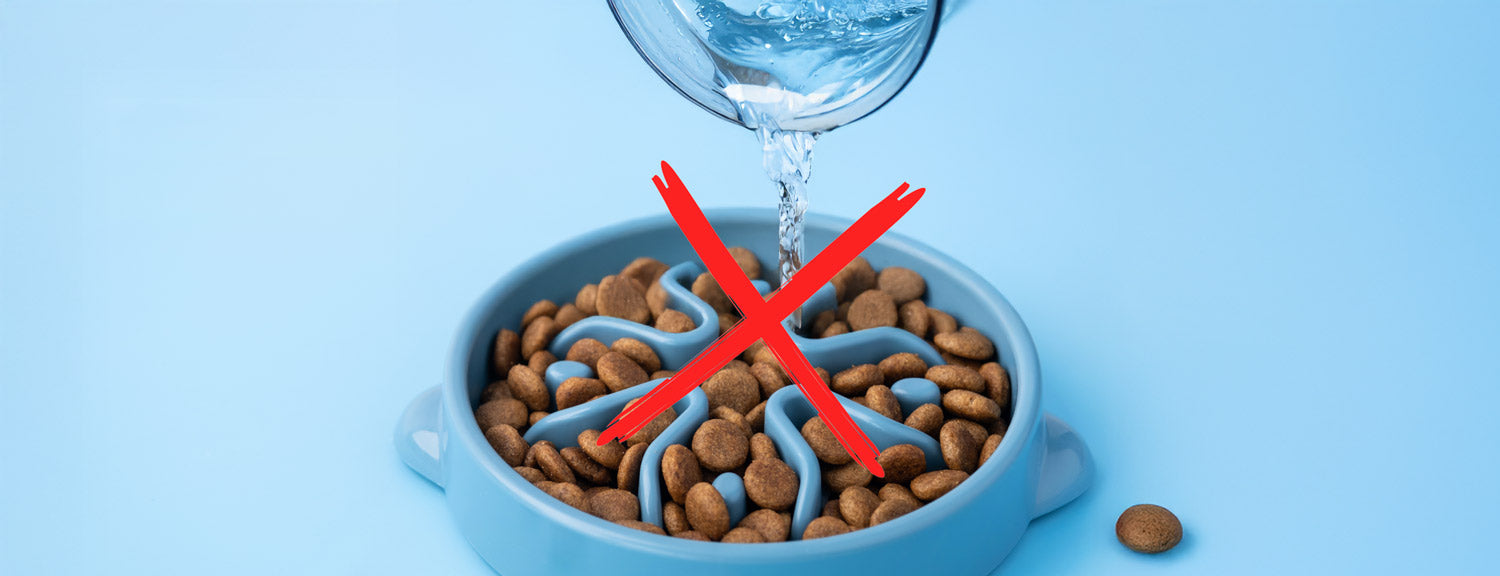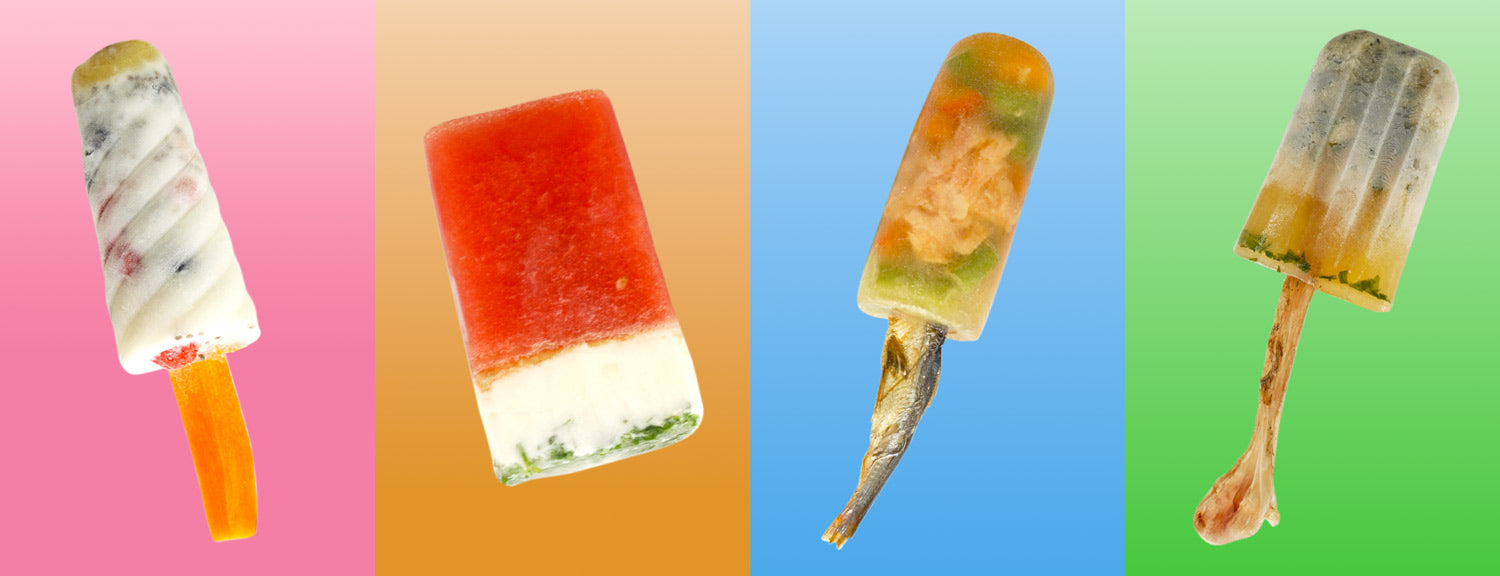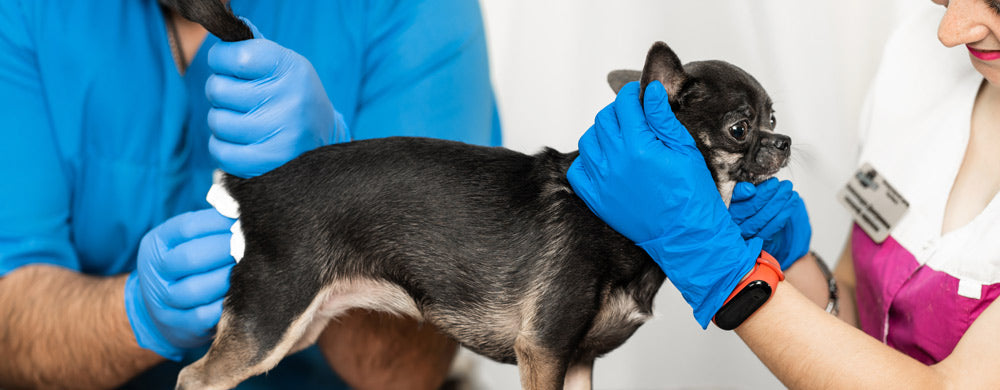Your basket is empty

How to Prepare Your Dog for Firework Season
October 29, 2021 8 min read
Firework season is an enjoyable time of year for many households, but it’s an entirely different story for dog and pet owners. While loud bangs and vibrant colours lighting up the night sky may be entertaining to humans, it’s inherently stressful for dogs and other animals.
Noise is the main factor why dogs dislike fireworks, but the unpredictability, bright colours, and potent smells that come with them can be just as distressing.
If your pooch has never experienced fireworks before or is susceptible to anxiety from loud noises or unfair situations, here’s everything you need to know about how to prepare your dog for firework season.
***
Why Are Dogs Afraid of Fireworks?
Dogs are afraid of fireworks due to their vibrancy, loudness, and unpredictability, which trigger their nervous system and fight-or-flight response.
It’s common for dogs to fear or feel threatened by loud sounds such as thunderstorms or sudden knocks at the door for this reason. However, fireworks tend to induce a more severe reaction in dogs because those loud noises are also accompanied by vivid colours, flashes of light, and burning smells.
Dogs experience the world and their environment through their ears, eyes, and nose. As fireworks stimulate all of these senses in dogs, it can often be overwhelming for them. Fireworks also emit various types of sounds that can startle your dog, including booms, whistles, and crackles, and often come at unexpected intervals.
Your dog is unable to predict the next type of noise or when it will appear, making it hard for them to settle down or become desensitised to the situation.
In addition, Bonfire Night, Diwali, and New Year’s Eve celebrations usually involve other sounds your dog may not be used to, such as noisy human conversation and music. This can make the experience even more stressful and frightening.
***
Can Dogs Hear Fireworks From Far Away?
It’s no secret that dogs have excellent hearing as they are descendants of wolves, who rely on hearing quiet, high-pitched sounds to hunt for prey. But dogs aren’t just limited to hearing high-pitched sounds, they also can pick up long-distance noises.

Compared to adult humans, who can only hear sounds from around 20 metres away and up to 20,000 Hz, dogs can hear sounds from up to 80 metres and as high as47,000 to 65,000 Hz.
This means they can sense fireworks and other sounds from far away. In fact, as dogs can hear higher frequencies than humans, loud noises sound even louder to them. That’s why fireworks, even if they’re located in the distance, can cause anxiety and fear in dogs.
So, if you’re having to cover your ears from a noisy bang or boom from a firework, imagine the impact it's having on your dog’s ears.
***
Why Is My Dog Shaking During Fireworks?
If your dog is shaking during fireworks, they are most likely scared or anxious. As mentioned earlier, festivities that include fireworks like Bonfire Night and Diwali can overstimulate your dog’s senses, causing feelings of uneasiness and nervousness.
***
What Are Dog Anxiety Symptoms During Fireworks?
Dogs suffering from anxiety during fireworks can display an array of unpleasant symptoms and behaviours, including:
- Restlessness or pacing
- Cowering
- Shaking or trembling
- Lip licking or yawning
- Hiding
- Clinginess or seeking comfort from the owner
- Panting
- Barking, whining, or crying
- Ears pinned back
- Furrowed brow
- Increased alertness
- Loss of appetite
- Freezing in place
- Trying to escape
- Destructive behaviour like chewing furniture or walls
***
Tips to Calm and Comfort Your Dog
While you can’t completely eradicate a dog’s anxiety or fear if they have a noise aversion to fireworks without extensive training, there are some things you can do to make the experience a little less scary and unpleasant for them, which we’ll go over below.
- Close all windows and curtains to block out some of the noise and light. Turn the lights on in your house to reduce the intensity of flashes from fireworks.
- Set up a den or safe space in a small area like a bathroom for your dog that they can retreat to when they feel threatened/overwhelmed. Fill the space with blankets, toys, some clothes that smell of you, and put on a radio or a bit of music.
- If your dog is crate-trained, this is likely already a comforting area for them, so make sure they can access it.
- Turn on a TV or radio to help muffle the noise of fireworks.
-
If your dog is pacing, whining, or hiding, let them. Don’t yell at your dog as this will only make them feel more anxious. Once your dog has chosen a hiding area (this could be under a chair or a bed), try to avoid bothering them.

- Praise your dog for calm or relaxed behaviour so they know they’re doing a good job!
- If your dog is seeking comfort and attention from you, be sure to give it to them. Some dogs will act more clingy when they are scared and nervous, while others will prefer to be undisturbed.
- Consider investing in a dog anxiety wrap or vest. These tight-fitting garments apply gentle pressure to your dog’s body, promoting the release of calming hormones like oxytocin and endorphins.
***
What Is the Best Dog Calming Aid?
If your pooch is prone to anxiety or destructive behaviour, especially during fireworks, a dog calming aid can be extremely beneficial. Dog calming aids come in a variety of forms, including sprays, diffusers, treats, supplements, and oils.
They contain various essential oils and ingredients that are known to calm dogs to help alleviate stress and anxiety, allowing them to relax and unwind.
For instance, our Goodie calming treats are made usingchamomile and lavender to promote feelings of calm in dogs when they are in panic mode, such as during firework season. In addition to being completely natural and grain-free, Goodie contains other helpful ingredients like probiotics for great digestive health.
 If your dog is particularly sensitive to noise aversions or anxious behaviours, another great product to have around the house is our KALMI organic hemp seed oil. Made from 100% natural hemp seed oil, KALMI works in just 20 to 30 minutes, effectively keeping dogs calm during an unsettling or stressful situation.
If your dog is particularly sensitive to noise aversions or anxious behaviours, another great product to have around the house is our KALMI organic hemp seed oil. Made from 100% natural hemp seed oil, KALMI works in just 20 to 30 minutes, effectively keeping dogs calm during an unsettling or stressful situation.
Alongside its calming effect, hemp seed oil contains omega 3 and omega 6 fatty acids and gamma-linolenic acid, which helps reduce itchiness and dry skin. And if that wasn’t enough, hemp seed oil also promotes flexible, strong joints and a healthy immune system!
However, it’s worth keeping in mind calming vests, sprays, supplements or other calming aids will work best while combined with positive reinforcement training that we will go over later in the article, so keep reading.
***
Firework Safety for Pets
While keeping your dog calm and relaxed is important during firework celebrations, it’s equally as critical to know how to keep your dog safe during this time of year.
Firework season typically starts towards the middle or end of October and lasts until early January after New Year’s Day, though you’ll usually find most people letting off fireworks during November.

Bonfire Night always falls on the 5th of November, but Diwali can begin in either mid-October or mid-November as it’s dependent on the cycle of the moon. It’s best if you start taking safety precautions in mid-October, even if you haven’t heard any fireworks in your area yet.
Walks should be done during daylight hours to reduce the chance of a firework appearing while your dog is outside. You should also make sure your dog is wearing an ID tag and has been microchipped so you’re prepared if they run off or escape. Make sure your details on the microchip are up to date.
Feed your dog’s last meal of the day earlier than normal during firework season as they may lose their appetite. Make sure your house is secure (windows, doors, and curtains closed) and your garden is dog-proof (gates closed, holes blocked off, etc).
When fireworks are being set off, don’t let your dog outside as they could injure themselves if they attempt to flee or fight the commotion. Worse yet, being so close to the noise could irreversibly damage their ears.
***
Are Fireworks Traumatising for Dogs?
Fireworks can be traumatising for dogs, especially if they have never encountered them before. Desensitising your dog to loud noises from an early age can improve their confidence around unfamiliar sounds, making them less likely to react negatively or fearfully. This is why it's so important that breeders expose puppies to such noises. It is said pups who experienced thunderstorms in their first four months of life were 2.26 times less likely to be scared of thunder in later life. Additionally autumn bred dogs are less likely to suffer with a fear of fireworks.
Bear in mind that desensitation process can take several months or longer as you’ll need to gradually build up your dog’s courage. Start off slow by putting on some sounds your dog is least scared of at the lowest volume.

Make sure to do this inside to prevent your dog from getting distracted by other sights and noises. Leave a door open to another room so your dog can escape if they feel overwhelmed.
Gradually increase the volume of the sound until you spot a reaction from your dog (this could be a small sign such as a slight twitch of the ears), then keep at that volume for a few minutes.
If your dog becomes visibly scared or stressed from the noise, discontinue the training for the day and try again tomorrow, making sure to begin at a lower volume next time.
Once your dog no longer reacts to the sounds at their highest volume, you can begin to build up a positive association between your pooch and loud noises. Grab some treats, toys, or your dog’s food, and play the sounds from the previous step at the lowest setting.
As the sounds are playing, play with your dog or offer them food. After they have finished eating or playing, turn off the sounds immediately. Hopefully, your dog will begin to associate the sound with something positive. Repeat this multiple times over a few days until your dog becomes excited as soon as they hear the sounds. You can then slowly increase the volume of the sounds until they are the loudest volume and your dog no longer acts negatively or fearfully.
Alternatively, if your dog loves meal times and is already excited you can play the sound of the fireworks with every meal for at least 8 weeks to build up a positive response. A survey of over 1.2K dogs showed that feeding and playing the sounds proved to be more successful in helping to change dog's fearful response to fireworks than other training or alternative therapies.
Another thing you could try is to redirect your dog's emotional state through play. Dogs become aroused during play time as well as when they're frightened. So rather than trying to keep them calm or still, engage them through playing with toys or food.
***
Final Thoughts
Although some dogs are unperturbed by fireworks, it’s estimated that 45% of dogs in the UK will display signs of anxiety or stress. Preparing your dog for firework season will help make things go a little easier for both of you, resulting in a much less negative experience.
Providing your dog with a safe area to relax in with the TV/radio on and the windows and curtains closed can help them feel more secure and comfortable, alongside calming aids like our KALMI hemp seed oil and Goodie calming treats.
Also in Pet Advice

Should You Add Water to Your Dog’s Kibble? Here’s What the Science Says
August 14, 2025 7 min read
Should you add water to your dog’s kibble? Discover the science-backed pros, cons, and better alternatives like bone broth and fresh food to improve hydration, digestion, and overall canine health...

DIY Frozen Dog Treats Your Pup Will Love
June 27, 2025 4 min read
Summer heat can be dangerous for dogs, making hydration more important than ever. Learn how to spot signs of dehydration, boost your pup’s water intake, and create fun, frozen recipes to keep them happy and healthy all season long.

Why Is My Dog Scooting? Common Causes and How Diet Can Help
May 09, 2025 4 min read
If your dog is scooting or smells fishy, it could be due to blocked or irritated anal glands. Learn what causes blocked anal glands, which dogs are most at risk, and how simple dietary changes—like adding fibre and anti-inflammatory nutrients—can help prevent recurring problems.
Search our shop
In this article
- Why Are Dogs Afraid of Fireworks?
- Can Dogs Hear Fireworks From Far Away?
- Why Is My Dog Shaking During Fireworks?
- What Are Dog Anxiety Symptoms During Fireworks?
- Tips to Calm and Comfort Your Dog
- What Is the Best Dog Calming Aid?
- Firework Safety for Pets
- Are Fireworks Traumatising for Dogs?
- Final Thoughts
